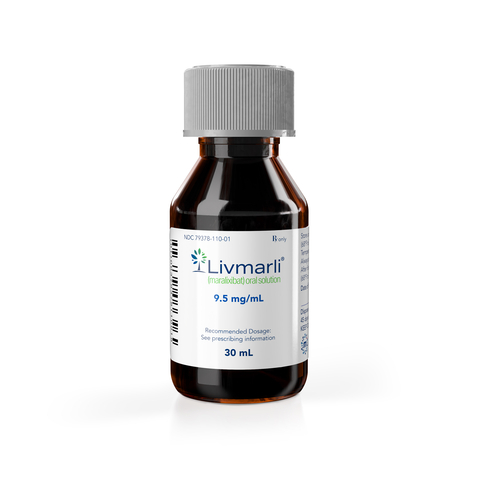Mirum Pharmaceuticals’ LIVMARLI Receives FDA Approval for Treatment of Cholestatic Pruritus in Patients with Progressive Familial Intrahepatic Cholestasis
- None.
- None.
Insights
The FDA's approval of LIVMARLI for cholestatic pruritus in PFIC patients represents a significant milestone in the treatment of this rare liver disease. The efficacy of LIVMARLI, as evidenced by the MARCH Phase 3 study, indicates a high level of statistical significance (p<0.0001), suggesting that the drug has a strong effect on reducing pruritus severity compared to placebo. This outcome is especially relevant for pediatric patients, as PFIC primarily affects children, leading to severe symptoms and impacting their quality of life.
From a medical research perspective, the broad label coverage for various PFIC subtypes implies that LIVMARLI can cater to a wider patient population. This inclusivity is noteworthy since rare diseases often struggle with limited treatment options. The additional sNDA for a higher concentration formulation to include younger patients further demonstrates Mirum's commitment to addressing unmet needs within this patient community.
For stakeholders, the immediate availability of LIVMARLI in the U.S. could lead to an uptick in the company's revenue stream. However, the long-term impact will depend on the adoption rate among healthcare providers, patient accessibility and potential competition from other treatments. The cost of treatment and insurance coverage will also play a crucial role in its market penetration.
The approval of LIVMARLI by the FDA not only signifies a breakthrough in the therapeutic landscape for PFIC but also has the potential to disrupt the market for cholestatic pruritus treatments. Given the rarity of PFIC, with an estimated prevalence of 1 in every 50,000 to 100,000 live births, the market size is relatively small. However, the lack of alternative treatments provides Mirum Pharmaceuticals with a significant competitive advantage.
Investors should note the potential for market expansion with Mirum's strategic move to submit an sNDA for a higher concentration formulation, which could increase the addressable market by including younger patients. The company's proactive approach to label expansion could be indicative of its long-term growth strategy and commitment to consolidating its presence in the rare disease market.
It is important to monitor how Mirum Pharmaceuticals capitalizes on its first-mover advantage and how it navigates pricing and reimbursement challenges. The company's performance in the coming quarters will provide insights into the drug's market uptake and its impact on Mirum's financial health.
The economic implications of introducing a new treatment like LIVMARLI are multifaceted. On one hand, the drug provides a non-surgical alternative to liver transplantation, which could lead to significant cost savings for the healthcare system. On the other hand, the pricing strategy for orphan drugs, typically high due to research and development costs, could impose a financial burden on patients and payers.
An analysis of the cost-effectiveness of LIVMARLI should consider the potential reduction in healthcare resource utilization, such as fewer hospitalizations and medical interventions due to improved disease management. Additionally, the impact on patients' quality of life and the indirect costs associated with PFIC, such as lost productivity for caregivers, must be factored into the overall economic assessment.
While LIVMARLI's approval is a positive development for patients, it is crucial to examine the sustainability of its pricing and reimbursement models, especially as healthcare systems globally are increasingly pressured to balance patient access with affordability.
- FDA approval based on MARCH Phase 3 study with highly statistically significant (p<0.0001) reduction in pruritus severity between LIVMARLI vs. placebo
- Label covers broad range of PFIC subtypes
- Immediate launch and availability for eligible patients in the

LIVMARLI® (maralixibat) oral solution is now available for prescribing in the US for cholestatic pruritus in patients with PFIC. (Photo: Business Wire)
LIVMARLI is also approved for the treatment of cholestatic pruritus in patients with Alagille syndrome (ALGS) in the
“LIVMARLI has the potential to have a transformational impact for patients with cholestatic pruritus associated with PFIC, and importantly, offers an option for those patients with the rarest of subtypes,” said Chris Peetz, chief executive officer at Mirum. “Thank you to the patients, families, and clinicians whose study participation made this approval possible.”
The approval is based on data from the Phase 3 MARCH study, the largest randomized trial conducted in PFIC, with 93 patients across a range of genetic PFIC types, including PFIC1, PFIC2, PFIC3, PFIC4, PFIC6, and unidentified mutational status.
“LIVMARLI’s approval in cholestatic pruritus for patients with PFIC is a result of years of investigation and a collection of a strong body of clinical evidence showing meaningful improvements across a number of important parameters, including pruritus, affecting children with PFIC,” said Richard Thompson, professor of molecular hepatology at King’s College London and an investigator in the MARCH study. “I am pleased that we will have a well-studied and efficacious option to offer patients whose life has been disrupted by itch.”
“PFIC is a difficult disease for both the patient and family and significantly impedes the quality of life for all,” said Emily Ventura, executive director of the PFIC Network and mom to a daughter with PFIC. “These young and fragile patients endure an itch so severe that they experience deficits in their sleep, nutrition, growth, and, in the past, some have turned to transplant to resolve their itch. We are hopeful that LIVMARLI will have a measurable impact for patients, potentially offering a new normal and relief from the sleepless nights and disruption to their lives caused by cholestatic pruritus.”
About PFIC
Progressive familial intrahepatic cholestasis (PFIC) is a rare genetic disorder that causes progressive liver disease typically leading to liver failure. In people with PFIC, liver cells are less able to secrete bile. The resulting buildup of bile causes liver disease in affected individuals. Signs and symptoms of PFIC typically begin in infancy. Patients experience severe itching, jaundice, failure to grow at the expected rate (failure to thrive), and an increasing inability of the liver to function (liver failure). The disease is estimated to affect one in every 50,000 to 100,000 births in
About LIVMARLI® (maralixibat) oral solution
LIVMARLI® (maralixibat) oral solution is an orally administered, once-daily, ileal bile acid transporter (IBAT) inhibitor and the only approved medication by the
LIVMARLI is also the only approved IBAT inhibitor approved by the European Commission for the treatment of cholestatic pruritus in patients with ALGS two months and older, and by Health Canada for the treatment of cholestatic pruritus in ALGS. For more information for
Mirum has also submitted LIVMARLI for approval in
LIVMARLI has received Breakthrough Therapy designation for ALGS and PFIC type 2 and orphan designation for ALGS and PFIC. To learn more about ongoing clinical trials with LIVMARLI, please visit Mirum’s clinical trials section on the company’s website.
IMPORTANT SAFETY INFORMATION
Limitation of Use: LIVMARLI is not for use in PFIC type 2 patients who have a severe defect in the bile salt export pump (BSEP) protein.
LIVMARLI can cause side effects, including:
Liver injury. Changes in certain liver tests are common in patients with Alagille syndrome and PFIC but can worsen during treatment. These changes may be a sign of liver injury. In PFIC, this can be serious or may lead to liver transplant or death. Your healthcare provider should do blood tests and physical exams before starting and during treatment to check your liver function. Tell your healthcare provider right away if you get any signs or symptoms of liver problems, including nausea or vomiting, skin or the white part of the eye turns yellow, dark or brown urine, pain on the right side of the stomach (abdomen), bloating in your stomach area, loss of appetite or bleeding or bruising more easily than normal.
Stomach and intestinal (gastrointestinal) problems. LIVMARLI can cause stomach and intestinal problems, including diarrhea and stomach pain. Your healthcare provider may advise you to monitor for new or worsening stomach problems including stomach pain, diarrhea, blood in your stool or vomiting. Tell your healthcare provider right away if you have any of these symptoms more often or more severely than normal for you.
A condition called Fat Soluble Vitamin (FSV) Deficiency caused by low levels of certain vitamins (vitamin A, D, E, and K) stored in body fat is common in patients with Alagille syndrome and PFIC but may worsen during treatment. Your healthcare provider should do blood tests before starting and during treatment and may monitor for bone fractures and bleeding which have been reported as common side effects.
US Prescribing Information
EU SmPC
Canadian Product Monograph
About Mirum Pharmaceuticals, Inc.
Mirum Pharmaceuticals, Inc. is a biopharmaceutical company dedicated to transforming the treatment of rare diseases affecting children and adults. Mirum has three approved medications: LIVMARLI® (maralixibat) oral solution, CHOLBAM® (cholic acid) capsules, and CHENODAL® (chenodiol) tablets.
LIVMARLI, an IBAT inhibitor, is approved for the treatment of two rare liver diseases affecting children and adults. It is approved for the treatment of cholestatic pruritus in patients with Alagille syndrome in the
Mirum’s late-stage pipeline includes two investigational treatments for debilitating liver diseases. Volixibat, an IBAT inhibitor, is being evaluated in two potentially registrational studies including the Phase 2b VISTAS study for primary sclerosing cholangitis and Phase 2b VANTAGE study for primary biliary cholangitis. Lastly, CHENODAL, has been evaluated in a Phase 3 clinical study, RESTORE, to treat patients with CTX, with positive topline results reported in 2023.
To learn more about Mirum, visit mirumpharma.com and follow Mirum on Facebook, LinkedIn, Instagram and Twitter.
Forward-Looking Statements
Statements contained in this press release regarding matters that are not historical facts are “forward-looking statements” within the meaning of the Private Securities Litigation Reform Act of 1995. Such forward-looking statements include statements regarding, among other things, the potential impacts of LIVMARLI in PFIC and for any future label expansion, the additional improvements in disease beyond pruritus, and the ability of LIVMARLI to modify PFIC patient disease experience and the continued commercial success of LIVMARLI across ALGS and PFIC. Because such statements are subject to risks and uncertainties, actual results may differ materially from those expressed or implied by such forward-looking statements. Words such as “will,” “intended,” “potential” and similar expressions are intended to identify forward-looking statements. These forward-looking statements are based upon Mirum’s current expectations and involve assumptions that may never materialize or may prove to be incorrect. Actual results could differ materially from those anticipated in such forward-looking statements as a result of various risks and uncertainties, which include, without limitation, risks and uncertainties associated with Mirum’s business in general, the impact of geopolitical and macroeconomic events , and the other risks described in Mirum’s filings with the Securities and Exchange Commission, including its most recent Annual Report on Form 10-K, as updated by any subsequent Quarter Reports on Form 10-Q. All forward-looking statements contained in this press release speak only as of the date on which they were made and are based on management’s assumptions and estimates as of such date. Mirum undertakes no obligation to update such statements to reflect events that occur or circumstances that exist after the date on which they were made, except as required by law.
View source version on businesswire.com: https://www.businesswire.com/news/home/20240313135184/en/
Media:
Erin Murphy
510-508-6521
media@mirumpharma.com
Investors:
Andrew McKibben
ir@mirumpharma.com
Sam Martin
Argot Partners
ir@mirumpharma.com
Source: Mirum Pharmaceuticals, Inc.







